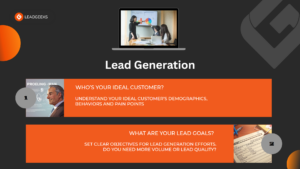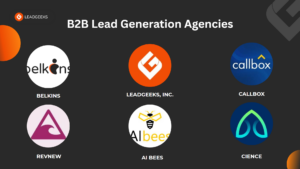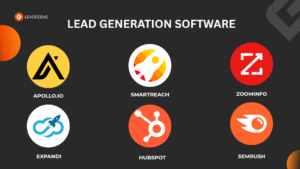In today’s digital world, attracting new customers is key to business growth and staying ahead of the competition. That’s where B2B lead generation companies come in, offering specialized services to funnel potential clients to your doorstep. However, choosing the right one amidst a sea of providers is no small feat.
Many businesses find it challenging to identify a B2B lead generation company that not only talks the talk but also walks the walk. The best B2B lead generation companies are able to deliver promises with transparency and tangible results. In this post, we will explore key considerations for selecting the right B2B lead generation company.
Step 1: Have Targets and Goals
Before diving in, understand your ideal customer and what you want to achieve. This sets the stage for finding a company that aligns with your needs.
Who’s your ideal customer?
Understand the demographics, behaviors, and pain points of your target audience. Are they individuals or businesses? What age group, gender, location, and income level do they belong to? What challenges or needs are they facing that your product or service can address? Knowing these details will help you identify a lead generation partner that can effectively reach and engage with your audience.
Here’s a list of characteristics you can use to define your ideal customer to get you started:
Demographics
-
Industry/Sector: Are you targeting healthcare, SaaS, manufacturing, or niche verticals like renewable energy?
-
Company Size: Startups (<50 employees), mid-market (50-500), or enterprises (500+)?
-
Job Titles/Roles: Decision-makers (CMOs, CFOs) vs. influencers (managers, analysts)?
-
Geography: Local, regional, or global?
Psychographics
-
What are their top challenges? (e.g., compliance risks, budget constraints, scalability issues)
-
What outcomes are they desperate to achieve? (e.g., reduce operational costs by 20%, improve data security)
-
What keeps them up at night? (e.g., fear of data breaches, pressure to meet ESG goals)
Behavioral Data
-
Awareness: How do they research solutions? (e.g., Google searches, LinkedIn groups, industry reports)
-
Consideration: What criteria do they use to evaluate vendors? (e.g., case studies, pricing transparency)
-
Decision: Who is involved in final approvals? (e.g., procurement teams, legal departments)
Lets try putting all of those information into one to have an example ideal customer profile! Lets say you are a cybersecurity firm working for the healthcare industry. In this case, we can breakdown your ideal customers as:
Demographics
-
Industry/Sector: Healthcare
-
Company Size: Enterprises
-
Job Titles/Roles: CFOs
-
Geography: Global
Pyschographics
-
Their top challenge: Data breach of sensitive data.
-
Outcome expected: Improvement in data security
-
Threats without Solution: Leak of sensitive patient data
Behavioral Data
-
Awareness: They posted a recruitment for an internal IT team with expertise in cybersecurity as requirement
-
Consideration: They asked for case studies or price list after contact.
-
Decision: They mentioned forwarding your offer to their higher-ups
What are your goals?
Define clear objectives for your lead generation efforts. Do you want to increase the volume of leads? Improve lead quality? Higher conversion rates? Maybe a combination of these outcomes? Are you looking to expand into new markets, launch a new product, or increase market share? Having specific goals will guide you to a B2B lead generation company that can deliver the results you’re aiming for.
Lets break down some goals you can set in lead generation and divide them into short-term and long-term goals:
Short-term Lead Generation Goals
-
Lead Volume: Increase MQLs (Marketing Qualified Leads) by 30% in 6 months.
-
Lead Quality: Ensure 70% of leads meet BANT criteria (Budget, Authority, Need, Timeline).
-
Engagement: Boost webinar sign-ups by 50% using targeted LinkedIn ads.
Long-Term Goals: Strategic Growth
-
Market Expansion: Capture 15% market share in the APAC region within 2 years.
-
Brand Authority: Become a top-3 search result for “AI-driven supply chain solutions.”
-
Customer Lifetime Value (CLV): Increase CLV by 25% through upselling/cross-selling.
Of course, the goals above are only examples. For your specific business, your goals may look different. To help with that, lets cover some common mistakes done in setting goals!
Avoid These Common Goal-Setting Mistakes
-
Vague Objectives:
-
❌ “Generate more leads.”
-
✅ “Generate 500 MQLs with 40% SQL conversion in 12 months.”
-
-
Ignoring Alignment: Sales and marketing teams must agree on lead definitions and handoff processes.
-
Overlooking Retention: Don’t just focus on new leads—include upsell/cross-sell targets.
With these insights sorted, you will be better equipped to find a lead generation partner that can meet your unique needs.

Step 2: Look for Expertise
Experience matters. Look for B2B Lead Generation companies with a solid track record and expertise in your industry.
Industry specialization
Find a lead generation company that specializes in your industry or has experience working with businesses similar to yours. A company that understands the unique challenges, trends, and market dynamics of your industry will be better equipped to develop targeted and impactful lead generation campaigns.
To hammer home why being a specialist in the industry is important for lead generation, lets cover some specific industry’s unique lead generation challenges!
-
Healthcare: Compliance (HIPAA, GDPR), long sales cycles, and multi-stakeholder approvals.
-
SaaS: Free trial optimization, churn reduction, and technical buyer education.
-
Manufacturing: Supply chain disruptions, RFQ processes, and procurement team dynamics.
It’s important to highlight that this is only from three examples. Each industry has their own challenges and specific solutions to tackle them as well. This is why vague answers such as “we serve all industry!” is a HUGE red flag.
Case studies
These success stories from previous projects can help you assess their track record and the results they’ve achieved for past clients. Pay attention to metrics like lead volume, lead quality, conversion rates, and return on investment (ROI). This information can help you gauge whether or not they’re the right fit for your business.
Typically, these are what you want to look for in a case study:
-
The Problem: What challenge did the client face? (e.g., low lead quality, stagnant pipeline).
-
The Solution: Specific tactics used (e.g., ABM, LinkedIn ads, webinar funnels).
-
The Results: Quantifiable outcomes tied to business goals.
The metrics I mentioned before should align particularly answer these three areas. Avoid firms that provide vague numbers, like “We increased leads by 200%!” Is this increase MQLs? Clicks? Keeping an eye out and focusing more on the solutions and results that they give is key in finding the perfect partner for you.

Step 3: Explore Methods and Tech
How B2B Lead Generation companies generates leads and the tools they use are crucial. Make sure their approach aligns with your brand.
- Lead generation tactics: Understand the lead generation tactics and strategies employed by the company. Are they focused on inbound marketing, outbound marketing, or a combination of both? Consider which tactics are most suitable for your target audience and industry. Choose a lead generation partner that have and able to execute these strategies effectively.
- Technology: Inquire about the technology and tools used by the lead generation company to generate, track, and manage leads. Look for a partner that leverages cutting-edge technology; such as marketing automation and data analytics tools, to deliver measurable results and optimize lead generation campaigns over time.

Step 4: Assess Lead Quality
Quality over quantity. Ensure the company focuses on delivering leads that are ready to convert.
- Lead qualification: Gain an understanding of how the lead generation company qualifies leads to ensure they meet your criteria for quality and relevance. What criteria do they use to determine lead fit and readiness to engage with your sales team? Do they have a lead scoring system in place to prioritize leads based on their likelihood to convert? A robust lead qualification process ensures that the leads delivered to your sales team are genuinely interested in your products or services and have a high potential to become paying customers.
- Lead nurturing: Ask about the nurturing strategies employed by the lead generation company to facilitate their leads progression towards conversion. Lead nurturing involves engaging with leads at various stages of the buyer’s journey, providing them with relevant content, addressing their questions and concerns, and guiding them towards making a purchase decision. A lead generation partner that offers comprehensive lead nurturing services can help you maximize the value of your leads and increase conversion rates over time.
Step 5: What’s their Price?
Cost is important, but so is ROI. Make sure their pricing structure fits your budget and goals.
- Cost-effectiveness: Consider the cost-effectiveness of the lead generation services offered by potential partners. While it’s essential to stay within budget, prioritize value over price alone. A more expensive lead generation service may offer higher quality leads, better conversion rates, and a stronger return on investment (ROI) compared to a cheaper alternative.
- ROI: Assess the potential return on investment (ROI) of partnering with a lead generation company by estimating the revenue generated from converting their leads compared to the cost of their services. Understanding the estimated ROI of each lead generation option will help you make an informed decision and allocate your budget effectively to achieve your business goals.
Ready to Choose?
Selecting the perfect lead generation partner is a pivotal decision, but fret not! By carefully considering factors such as audience insight, expertise, methods, lead quality, and pricing, you’re well on your way to finding the ideal fit for your business requirements. Take the time to thoroughly explore and assess your options, ensuring you ask all the pertinent questions along the journey. Remember, making the right choice can significantly enhance your lead generation efforts and propel your business forward!
If you’re in search of a B2B Lead Generation expert specializing in the STEM industry, delivering top-tier leads through a data-driven approach, all while maintaining cost-effectiveness, why not give LeadGeeks, Inc. a try? Click below to delve deeper and embark on your lead generation journey with us!















Leave a Reply